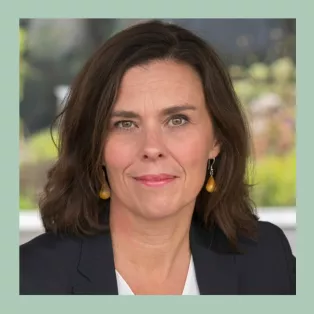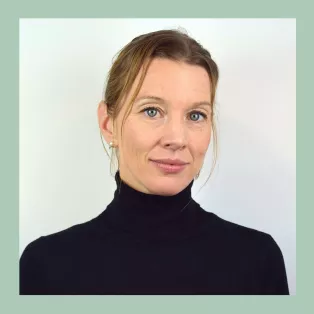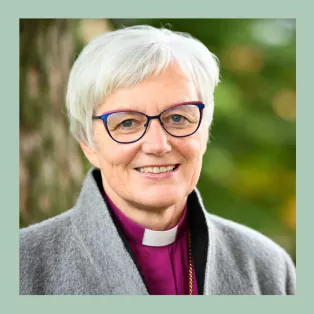Research Conference Programme, 4 Dec 2024
Knowledge for Sustainable Development – Our shared future in times of global conflict and crisis
08:30-08:55 Check-in and mingle with coffee
Registration at the check-in desk on the first floor of Stadshallen
09:00-09:15 Opening of the conference
Konsertsalen
Welcome greetings by Pro Vice-Chancellor Per Mickwitz
09:15-10:30 Plenary Keynotes - Session I
Konsertsalen
Moderator: Lisa Strömbom
09:15-09:45 Agenda 2030 at halfway point – headwinds, tailwinds and the role of research
Invited Keynote speaker Åsa Persson
Åsa Persson is Research Director and Deputy Director of the Stockholm Environment Institute, and Adjunct Professor at the Department of Thematic Research, Linköping university.
At halfway point of Agenda 2030, the world is not on track to meet the goals and targets, as concluded by the UN Global Sustainable Development Report. Crises have delayed action and conflicts undermine societies’ ability to develop in sustainable ways. In this talk, I look at what science has recommended in order to accelerate transformations, and what current headwinds and tailwinds mean for their feasibility. And what does this mean for a post-2030 agenda? How can science support in revising or rethinking sustainable development at the global level?
09:45-10:15 Breaking the Cycle: Tackling Food Insecurity, Conflict, and Climate through integrated approaches
Invited Keynote speaker Caroline Delgado
Caroline Delgado is a Senior Researcher and Director of the Food, Peace and Security Programme at SIPRI.
The world faces an urgent and intertwined crisis of escalating food insecurity, conflict, and environmental threats, each exacerbating the others in a vicious cycle. Rising armed conflicts, climate change, and severe ecological pressures have destabilized fragile food systems, pushing millions closer to famine and stoking global instability. Since 2015, gains in combating hunger have reversed, with food insecurity worsening alongside rising greenhouse gas emissions, resource depletion, and a near-quadrupling in major conflicts. By 2050, 2.8 billion people could live in high-risk regions, highlighting the critical need for coordinated, systemic action that integrates conflict resolution, climate adaptation, and sustainable food systems to break this viciouscycle.
10:15-10:30 Q&A
10:30-11:00 Coffee break
Stadshallen second floor common area
11:00-12:30 Parallel sessions with research presentations
Chair:
Markus Gunneflo, Department of Law
Presenting researchers:
Susanne Arvidsson, Business Administration
CSRD and ESRS: A focus on the first phase of the corporate adoption process
Eric Brandstedt, Human Rights Studies
The responsibilities of local governments for a just transition
Olena Bokareva, Department of Law
Legal Framework for Sustainable Carriage of Carbon Dioxide for Permanent Storage
Lovisa Halje, Business Law
Transposing the Corporate Sustainability Due Diligence Directive into Swedish law. Alternatives and pitfalls
Venue:
Konsertsalen
Chair:
Lisa Eklund, Department of Sociology
Presenting researchers:
Jörgen Dahlqvist, Malmö Theatre Academy
Using ’conversation theatre’ to engage citizens in deliverable conversations on democracy
Christian Palacios Haugestad, LUCSUS (Lund University Centre for Sustainability Studies) and University of Oslo
The politicisation of climate anxiety in public debate: a critical discourse analysis of news portrayals and reactions on social media
Emilia Ganslandt, LUCSUS (Lund University Centre for Sustainability Studies)
Time to reconsider Nordic Exceptionalism? – The case for a Nordic Intersectional Environmental Justice in a Time of Crisis
Thomas Hickmann, Department of Political Science
The role of universities in the global endeavor to implement the Sustainable Development Goals
Venue:
Amfi
Chair:
Claudia Ituarte-Lima, Raoul Wallenberg Institute of Human Rights and Humanitarian Law
Presenting researchers:
Pablo Pastor Vidal, Department of Law
The humanitarian-development-peace nexus: looking for sustainable responses for refugees
Fariborz Zelli, Department of Political Science
SDG Change Agents under Threat: The Case of Environmental Human Rights Defenders in Colombia
Tanya Andersson Nystedt, Social Medicine and Global Health
Included and excluded: an intersectionality-based policy analysis of young migrants' vulnerability to sexual violence in Sweden
Anna Tegunimataka, Department of Economic History
Island Women and the Obesity Transition: A Comparative Analysis of Female Obesity Prevalence and Socioeconomic Gradients in Small Island Developing States
Venue:
Himla Borelius (max. capacity 25 people)
Chair:
Jenny Palm, The International Institute for Industrial Environmental Economics (IIIEE)
Presenting researchers:
Jonathan Freidrich, Department of Human Geography
Towards circular couplings: Conceptualizing the globally integrated circular economy
Linda Stihl, Department of Economic History
Circular transitions in global production networks? A multi-scalar approach to anticipating socio-economic and socio-environmental effects of ‘x-shoring’
Eugène Petelin, Environmental and Energy Systems Studies
Security priorities in circular economy transformation
Vitor Souza, Packaging Logistics
Towards an interdisciplinary theoretical framework to accelerate the transition of global value chains into the circular economy
Venue:
Danssalen (max. capacity 30 people)
12:30-13:30 Lunch break and poster presentations
Stadshallen second floor common area
Sami Al-Daghistani, Centre for Advanced Middle Eastern Studies (CMES)
Economic Cosmology: Ethics, Sustainability, and the Nonhuman in the Muslim World
Britta Sjöstedt - Beyond Borders, Department of Law
Participatory Strategies for Environmental Recovery in Ukraine
Carla Coelho, Centre for Environmental and Climate Science (CEC)
Quantifying impacts of global croplands on biodiversity
Emma Kritzberg, Department of Biology
Time to Walk the Talk: From climate Ambition to Efficiently Reduction the Academic Carbon Footprint
Sara Willhammar, William Tärneberg, Networks and Security
NextG2Com for a sustainable digital transformation of society
Ivan Maximov, Solid State Physics
Towards Sustainable Semiconductor Ecosystem in the Baltic Region
Mirjam Glessmer, Centre for Engineering Education, Steven Curtis, Division for Higher Education Development Karin Steen, LUCSUS, and Terese Thoni, Sustainability Forum
Teaching for Sustainability: the development of a cross-faculty initiative to curate and create resources for educators
Tullia Jack, Service Studies
Methods that make a difference
Sara Håkansson, Agenda 2030 Graduate School
Lund University Agenda 2030 Award – nominate a young researcher today
13:30-14:45 Plenary keynotes - Session II
Konsertsalen
Moderator: Magnus Sandberg
13:30-14:00 Saying goodbye to globalization: how to build sustainable academic collaboration in a polarized world
Invited Keynote speaker David Gisselsson Nord
David Gisselsson Nord is professor of molecular pathology and vice dean for international affairs and security at the Faculty of Medicine.
As the world becomes more volatile and politically polarized, international collaboration in research and education is increasingly challenged by security issues and pressures to align with national policies. How does this impact daily operations for faculty leadership and co-workers? How should universities adapt to maintain the ability to work internationally to solve global challenges?
14:00-14:30 Reconnecting to Humanity: The Role of Spirituality in Sustainable Practices
Invited Keyonte speaker Antje Jackelén
Antje Jackelén is senior advisor at the Centre for Theology and Religious Studies, Lund University, and former Archbishop of the Church of Sweden.
Sustainability is not only an ecological, economic and social necessity. With increasing awareness of global crises, spiritual sustainability is gaining more attention.
A vital aspect of spiritual sustainability is the engagement with the great intellectual traditions of humanity. When the moorings to the big words and ideas break, the result is micromanagement through rules. “We are just doing our job. We just follow the rules.” This is never good enough when humanity is at stake. There are situations and times that require people, individually and collectively, to think and act outside their comfort zone.
Such situations and times are now. This means that the hunger of the soul needs to be satisfied with special care.
14:30-14:45 Q&A
14:45-14:55 Short break to divide into parallel sessions
14:55-15:55 Parallel sessions with research presentations
Chair:
Åsa Lundqvist, Department of Sociology
Presenting researchers:
Oscar Gustafsson, Environmental and Energy Systems Studies
A Critical Miss? How Multilevel Substitution Can Help Alleviate Future Cobalt/Lithium/Graphite Constraints
Juan Samper, LUCSUS (Lund University Centre for Sustainability Studies)
What is the resource in conflict?
Mikael Klintman, Department of Sociology
Framing Naturalness in Times of Crisis: Disputes Over Ultra-Processed Plant Proteins and Sustainability
Venue:
Konsertsalen
Chair:
Jamil Khan, Environmental and Energy System Science
Presenting researchers:
Juan Ocampo, Department of Business Administration
Organizing Money - The process of implementing a complementary currency in a context of scarcity
Tullia Jack, Department of Service Studies
Sharing for sustainable development
Alexandra Kjellman, Department of Design Sciences
Towards sustainable packaging in e-commerce: A case study
Venue:
Amfi
Join LU Innovation for a workshop on how your research can create impact in the world through innovation
During the workshop, we examine how your own research could bring about meaningful change by adopting the perspectives of 'need', 'approach', and 'benefit'.
We will start by considering the needs your research could meet and what problems it could solve, for example, during environmental crises or global conflict. Then, we will discuss your unique way to approach these problems and consider the potential benefits your solutions could bring to society. Lastly, we will discuss how to take your ideas to the next level.
The workshop will be led by Peter Franck, Innovation Developer, who is specialised in sustainability and green tech and Sophie Picasso, Innovation Developer with a focus on Social Innovation.
Venue:
Hilma Borelius (max. capacity 25 people)
16:00 - Summary of the conference and glögg-mingle
Stadshallen second floor common area
If you wish to join the glögg-mingle, please contact ylva [dot] van_meeningen [at] cec [dot] lu [dot] se (ylva[dot]van_meeningen[at]cec[dot]lu[dot]se) before the conference.
Download Abstracts
Click here to download a PDF with all Research Presentation Abstracts.
Download programme
Download a PDF version of the programme here.
Time for the event
4 December 2024 08:30 to 17:00
Location
Stadshallen, Stortorget 9, Lund
Target group
Invited are researchers associated with Lund University, as well as other researchers, stakeholders, and students who wish to join the discussions and share their views and learn more about research conducted at Lund University.
Language
English
Contact
ylva [dot] van_meeningen [at] cec [dot] lu [dot] se (ylva[dot]van_meeningen[at]cec[dot]lu[dot]se)
The conference is organised by the Research Board in collaboration with the Sustainability Forum at Lund University.






